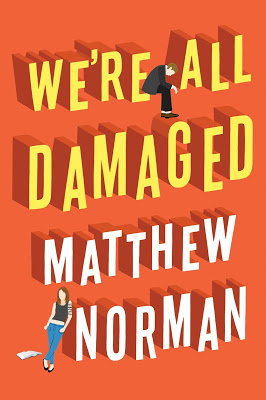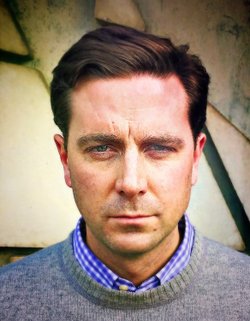 Matthew Norman’s debut novel, Domestic Violets, was a hilarious and poignant tale of a man trapped in a job he hated because he needed to provide for his family who wondered if he would ever fulfill his dreams. Norman’s snarky and self-deprecating style makes his follow-up book, We’re All Damaged, equally enjoyable. So I’m happy to welcome Matthew back to Colloquium today!
Matthew Norman’s debut novel, Domestic Violets, was a hilarious and poignant tale of a man trapped in a job he hated because he needed to provide for his family who wondered if he would ever fulfill his dreams. Norman’s snarky and self-deprecating style makes his follow-up book, We’re All Damaged, equally enjoyable. So I’m happy to welcome Matthew back to Colloquium today!
Cocktail Party Q & A
Other than my wife and kids, writing is the most important thing in my life. Due to some odd, neurotic glitch in my personality, though, when asked about it at cocktail parties, I am turned instantly into the world’s biggest idiot.
Ask me to talk about baseball, movies, or U2, and I’ll go on and on until someone shoots me with a tranquilizer dart. Ask me about the activity I’ve devoted my entire adult life to, and, well, get ready for a stream of nonsense followed by me falling down the stairs.
So, I’ve decided to use this opportunity to compile and properly answer the five writing questions I get most often at cocktail parties. And, just to keep things feeling authentic, I went ahead and had like five drinks.
1. Where do you get your ideas?
In my experience, ideas don’t arrive fully formed and ready to go. Instead, they show up in the smallest form possible and build slowly. I imagine a snowflake falling onto a mountain. It lands and is eventually pushed by a breeze. It sticks to a few other snowflakes until it’s a small snowball. Another breeze comes and that snowball starts rolling downward. And so on.
The snowflake for my first novel, Domestic Violets, came in the form of a fleeting thought while reading an article that mentioned Kurt Vonnegut’s son. I said to myself, “My God, what would it be like if your dad was one of the most famous writers ever?” The snowflake for my new novel, We’re All Damaged, was less fleeting. My parents moved to a neighborhood about ten years ago that has a bunch of weirdly specific rules about things like motorcycles and what you can and can’t wear while jogging. One day when I was visiting them, I devised an utterly childish plan to thumb my nose at those rules. The plan never came to fruition, but, a novel was born.
2. How much of your writing is autobiographical?
For me, the plots have always been totally made up. There are too many loose ends in real life—too much randomness. My characters have mostly been made up, too. I say “mostly,” because a few have been amalgamations of several real people, and one character in We’re All Damaged is a heavily fictionalized version of an old college friend who passed away several years ago.
However, I readily admit that a lot of what I write is emotionally autobiographical. We’re All Damaged is about a character who is heartbroken and lost and utterly paralyzed by the notion of moving on with his life. I’ve been there. Who among us hasn’t, right? That’s actually kind of the point of the whole book.
3. Are you ever worried what people you know will think of you?
I get this one a lot, actually. In both of my novels, there’s sex, swearing, bad decisions, destructive behavior, and some really dark thinking. And, I’ve written all of these things with the knowledge that my wife, parents, friends, in-laws, extended family, co-workers, and children (someday) will read them.
At some point in a writer’s development, he or she has to move beyond writing self-consciously. Frankly, if you write with a tiny version of your mother sitting on your shoulder, the results will likely be bland, harmless, and pretty boring.
I want my books to be fun and satisfying. I want readers to have trouble putting them down. But, more than any of that, I want my books to be emotionally real. And, sometimes, emotional reality comes with a Parental Advisory Explicit Lyrics sticker.
4. Is an MFA really worth it?
Whenever I’m asked this, I can see in the asker’s eyes that he or she very much wants me to say, “No, absolutely not!” MFAs are expensive, time-consuming, and there’s zero guarantee that they’ll lead to success. I get that. However, I can honestly say that getting my MFA from George Mason University was one of the most valuable things I’ve ever done. I learned things about writing in those three years that I believe would have taken me decades to piece together on my own. And, just as important, my MFA helped me find a great community of writers. Writing is hard, and it’s kind of weird, and it becomes an increasingly less reasonable pursuit as you get older. Building a support system of like-minded people has helped me immeasurably. Would I be a published novelist if I didn’t get an MFA? Who knows? Maybe, maybe not. I’m a better writer now than I would have been, though. Guaranteed.
5. I’ve always thought about giving writing a try. Do you have any advice?
For the love of God, don’t do it unless you have to!
If you don’t have to write, then don’t. Go about your life. Be happy. Run outside. Play with your dog or pet your moody little cat. Sit in a seaside café for hours on end. Get wildly drunk and laugh. Spend time with the people you love and sleep well. However, if you do have to write—if writing is a constant, nagging obsession that you can’t escape—well, my condolences. Now, stop reading this, and start writing. And do it every single day.
Meet Matthew

His debut novel, Domestic Violets, was nominated in the Best Humor category of the 2011 Goodreads Choice Awards. His essays about writing have appeared at Literary Hub and Writer Unboxed.
Matthew lives with his wife, two kids, and two dogs in Baltimore, Maryland and, occasionally, Fenwick Island, Delaware.
Connect with Matthew on his blog, The Norman Nation, Facebook, Twitter, or Goodreads!








8 Comments
Would love to read this book.
lomazowr@gmail.com
Matthew’s Q&A’s displays an open, honest, and inviting personality. I know I’d love his book, as well. 🙂
nicnac63 AT hotmail DOT com
I enjoyed this entertaining and amusing interview. The book would be an experience which I look forward to greatly. Wishing you the best of success and many adventures. Thanks for this lovely feature and giveaway.
This author is so talented and his writing advice wonderful. I would love to read this book as I could use cheering up. Thanks. He has great charm.
I just learned about Matthew Norman through LitHub. I look forward to reading his books! My husband and I also had low attendance at our “celebrity bartending” fundraiser to support one of our films. The bartender felt so sorry for us, he went to the bar next door to ask his friends to come over and drink at our fundraiser. They did. A blind girl also bussed and gave us her tips. It was very humbling. debradylan@gmail.com
Tempted enough to give a read. Entertaining and beautifully narrated interview section. Loved the way you have explained and answered the most important (in my opinion) question: “Where do you get your ideas?” I could relate myself with much of things that you have mentioned on this page.
Regards,
Rocco
I have heard so much about this book. I have been trying to win it everywhere. I would be so honored to win it to read and review, of course. My email address is: blanchard1954@yahoo.com
great interview. I learned an awful lot.
Great interview. Looking forward to reading this one!